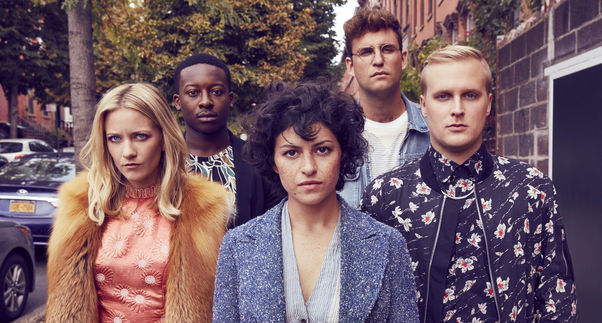Why Search Party should be your next box set
Review Overview
Laughs
9Mysteries
9Ennui
9Ivan Radford | On 01, Jan 2023
This spoiler-free review is based on Season 1.
There’s almost nothing worse in your 20s than feeling like you don’t have any direction. Drifting between unemployment, bored employment and appointments about employment, while filling up your days with endless trips to the nearest kettle. Thank goodness, then, for TV box sets, which mean that – for 5, 8 or 20 hours – you can forget about the frustrations of almost-adult life and immerse yourself in someone else’s tale.
Search Party is the kind of show that would appeal to Dory (Alia Shawkat), who finds her post-college group of friends all seeming to move forward in the world. There’s Portia (Meredith Hagner), a self-centred actress who has bagged a gig on a trashy crime show. There’s Elliot (John Early), a self-obsessed socialite who does a bit of art and a bit of charity work, whichever allows him to talk about himself the most. Dory, on the other hand, is an assistant to a rich woman with no further plans for her existence, something that preoccupies her above all things. Even her dull boyfriend, Drew (John Reynolds), at least has a function – as an unpaid cog in a corporate machine in the city.
When asked what she can bring to a teaching role in a job interview, Dory sits there, her mind a complete blank. The adult on the other side of the table nods, with a hint of pity. That pointlessness abounds in our central ensemble, whose shallow lives are either a cause of, or a product of, their shallow personalities. They go through life concerned solely about things that concern themselves.
And so when an old school friend, Chantal Witherbottom, goes missing, they react accordingly. Meeting for brunch, Portia announces how sad she is. Not because of Chantal, but because she can’t recall whether she’s slept with a nearby waiter. “In shock. Sad news about a sweet girl. Keep an eye out, people,” tweets Elliot, while in person, he does little more than shrug. Only Dory seems worried, deciding to investigate the disappearance and work out what happened.
Is Chantal dead? Has she been kidnapped? Is it something more or less sinister? Her hunt brings her into contact with a wonderful array of eccentric figures, from a possible cult and a melancholic former friend to her journalist ex-boyfriend, Julian (the charming Brandon Michael Hall) – she bumps into him a lot, often intentionally. Even a mysterious detective, Keith (a brilliantly intense Ron Livingston), turns up treading the same beat and chasing the same leads.
The rest of the gang get caught up in the search too and soon they’re crossing the line into dubious territory with all the presumption that middle-class, white hipsters can muster. They disrupt funerals, interrupt wedding plans and blackmail businessmen, not stopping to think twice about the impact of their actions. It’s the same wrapped-up attitude they bring to their love lives, which, naturally, are full of affairs and the calculated break-up of other couples; it doesn’t matter what they’re doing or who they’re doing, as long as they’re doing in the first place.
They sound like a horrible bunch and they are, as creators Sarah-Violet Bliss, Charles Rogers and Michael Showalter unflinchingly undermine their characters at every opportunity. But they’re also hilarious to witness, from Meredith Hagner’s chirpy-when-it-suits-her friend to John Early’s oblivious, ostentatious manipulator. Even Reynolds’ Drew is a Nice Guy whose stalker-like stare suggests his apparent kindness is perhaps closer to inactiveness, something that only becomes clear as he interacts with his and Dory’s neighbour.
Dory is the nicest of the bunch, and certainly the most relatable. A lot of that comes from Alia Shawkat. Continuing to impress ever since the days of Arrested Development, she’s a remarkable lead here, engaging us with her timid uncertainty, as well as her determination to get to the bottom of this mystery. Crucially, she’s the only one of the group who is aware that this is as much about finding Dory as it is finding Chantal. “Would anyone even care if something bad happened to me?” she asks, of nobody in particular, trying to prove to herself that not only does she have a reason to get out of bed, but that even the most forgettable of Millennials can be missed by someone. Even the name itself, Chantal Witherbottom, sounds like a MacGuffin made up by a wannabe Nancy Drew.
Of course, Chantal is missed by people – her family and her friends. But that doesn’t stop Dory and co taking it upon themselves to research, while others line up at a memorial evening to sing an a capella arrangement of “Since You’ve Been Gone”. The programme is full of such caustically funny moments, which sit perfectly on the fence between spiky and silly. “Something terrible could be happening,” exclaims Dory, when she hears screams and shouting from the flat upstairs. “Something terrible is happening everywhere all the time,” replies Drew, squirming his way out of helping.
This is a scathing satire of modern youth, but Search Party’s success lies in the way it packages that up inside a crime thriller. The music keeps the mix of tension and oddball humour finely balanced, while the direction, complete with some freaky dream sequences, feels simultaneously natural and over-the-top. The writing is just as brilliant: dished out in 25-minute slices, we never spend enough time with the characters to dislike them completely, while the careful drip-feed of twists and revelations means that we, like the world’s worst Scooby-Doo gang, cheer at every step forward in Dory’s case. We want her to succeed, with an affection that’s shared by Julian, perhaps the only adjusted and level-headed young person we meet.
A brisk, brash TV gem, the result is a gripping investigation that spends most of its time uncovering these Millennials’ own privileged self-absorption, but still manages to deliver a satisfying pay-off, while moving at a pace that means you’ll want to binge all 10 episodes without pause.
This review was originally published on 31st December 2016.




















